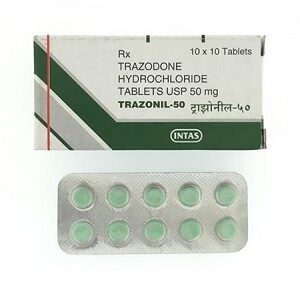Trazodone
Packages:
| Quantity | Per Pill | Price | Order |
|---|---|---|---|
|
200/50mg pills
Free EMS shipping with every order |
$ 0.60 | $120.00 | |
|
100/50mg pills
Free EMS shipping with every order |
$ 0.75 | $75.00 | |
|
50/50mg pills
Free EMS shipping with every order |
$ 1.00 | $50.00 | |
|
300/50mg pills
Free EMS shipping with every order |
$ 0.53 | $160.00 | |
|
600/50mg pills
Free EMS shipping with every order |
$ 0.42 | $250.00 | |
|
50/100mg pills
Free EMS shipping with every order |
$ 1.10 | $55.00 | |
|
100/100mg pills
Free EMS shipping with every order |
$ 0.90 | $90.00 | |
|
200/100mg pills
Free EMS shipping with every order |
$ 0.75 | $150.00 | |
|
300/100mg pills
Free EMS shipping with every order |
$ 0.63 | $190.00 | |
|
600/100mg pills
Free EMS shipping with every order |
$ 0.50 | $299.00 |
Description:
What is Trazodone?
Introduction: Trazodone, a medication primarily recognized for its role in treating depression and anxiety, has garnered attention for its multifaceted properties beyond its conventional applications. While it remains a staple in mental health treatment, recent research and clinical observations have shed light on its diverse therapeutic potential across various medical domains. In this article, we delve into the lesser-known facets of trazodone, exploring its expanding repertoire beyond mood disorders.
Trazodone: An Overview: Originally developed as an antidepressant in the 1960s, trazodone belongs to a class of medications known as serotonin antagonist and reuptake inhibitors (SARIs). Its mechanism of action involves enhancing serotonin activity in the brain while blocking certain serotonin receptors, contributing to its mood-regulating effects. Over the years, trazodone has gained popularity due to its favorable side effect profile and lower risk of dependence compared to other antidepressants.
Trazodone side effects
Beyond Depression: Emerging Applications: While trazodone remains a frontline treatment for depression and anxiety, its therapeutic utility extends far beyond mental health. Recent studies have highlighted its efficacy in managing various medical conditions, showcasing its versatility in clinical practice.
- Insomnia: Trazodone’s sedative properties have made it a popular choice for managing insomnia. Particularly in individuals with coexisting depression or anxiety. Its ability to promote sleep onset and improve sleep maintenance has positioned it as a valuable alternative to traditional hypnotic medications.
- Chronic Pain: Chronic pain conditions, such as fibromyalgia and neuropathic pain, often accompany mood disorders, presenting a complex clinical challenge. Trazodone’s dual action as an antidepressant and a modulator of pain perception makes it a promising adjunctive therapy for alleviating pain and improving overall quality of life.
- Sleep-related Breathing Disorders: In addition to its role in treating insomnia, trazodone has demonstrated efficacy in managing sleep-related breathing disorders, such as obstructive sleep apnea (OSA). By promoting deeper and more restorative sleep, trazodone may help reduce the frequency and severity of respiratory events during sleep, offering relief to individuals with OSA.
- Post-Traumatic Stress Disorder (PTSD): PTSD often co-occurs with depression and anxiety, presenting unique challenges in treatment. Emerging evidence suggests that trazodone may complement standard PTSD therapies by addressing sleep disturbances, mood dysregulation, and intrusive symptoms, thereby enhancing overall treatment outcomes
Alternatives of Trazadone
Trazodone is commonly prescribed as an antidepressant and a sleep aid. However, not everyone responds well to it due to side effects like dizziness, drowsiness, or next-day grogginess. Fortunately, several alternatives—both prescription and natural—may offer similar benefits with different risk profiles.
1. Mirtazapine
Mirtazapine (Remeron) is an antidepressant that also promotes sleep, making it a good option for those with major depressive disorder and insomnia. It works on noradrenergic and serotonergic systems and is often better tolerated than trazodone in some users.
2. Doxepin
Doxepin is a tricyclic antidepressant approved in low doses for insomnia (brand name: Silenor). It helps individuals stay asleep without the sedative hangover that sometimes accompanies trazodone.
3. Amitriptyline
Another tricyclic antidepressant, amitriptyline, is sometimes used for both depression and off-label sleep issues. It also helps with chronic pain, which may benefit people with comorbid conditions.
4. Hydroxyzine
This antihistamine is frequently prescribed for anxiety and sleep. It’s non-addictive and generally considered safe for short-term use.
5. Melatonin and Herbal Supplements
For those seeking natural options, melatonin, valerian root, and magnesium supplements may help regulate sleep cycles without the risks of pharmaceutical side effects.
6. Cognitive Behavioral Therapy for Insomnia (CBT-I)
When sleep is the primary concern, CBT-I is a gold-standard treatment that addresses underlying thought patterns and behaviors that affect sleep—often more effectively than medications.
At MyWavePharma you can buy Trazodone and several alternatives.
Conclusion: As our understanding of trazodone continues to evolve, so too does its role in clinical practice. Beyond its established efficacy in treating depression and anxiety, trazodone’s diverse pharmacological properties have paved the way for its utilization across a spectrum of medical conditions. From managing insomnia to mitigating chronic pain and addressing sleep-related breathing disorders, trazodone’s versatility underscores its value as a therapeutic agent with far-reaching implications for patient care. As ongoing research endeavors unravel its full potential, trazodone stands poised to redefine the boundaries of pharmacotherapy. It offers hope and healing to individuals navigating a myriad of health challenges.
